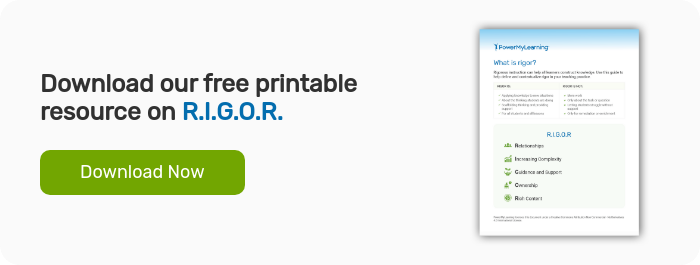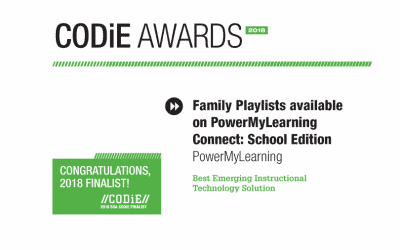Supercharge Teacher Practice: 3 Benefits of Instructional Coaching
It's no secret that education leaders need solutions to combat pressing challenges such as the teacher shortage and inequities in educational outcomes.
Research shows instructional coaching is a unique lever to strengthen teacher practice and improve student outcomes. But with so many coaching solutions on the market, where do you start?
To evaluate whether instructional coaching is the right fit to achieve your school or district goals, let's start by defining coaching.
What is coaching?
In her book, The Art of Coaching, Elena Aguilar says that coaching is not a way to enforce a program; it is not a tool to fix people; and it is not therapy.
So, what is coaching?
At PowerMyLearning, we define instructional coaching as one-on-one professional development to help teachers strengthen their teaching practices and improve student outcomes.
Jim Knight, founder of the Instructional Coaching Group, says, “Instructional coaches partner with teachers to analyze current reality, set goals, identify and explain teaching strategies to hit the goals, and provide support until the goals are met.”
Although coaching models vary widely, effective models share key characteristics. Education policy researchers Matthew A. Kraft, David Blazar, and Dylan Hogan determined that effective instructional coaching is:
- Individualized: coaching sessions are one-on-one
- Intensive: coaches and teachers interact at least every couple of weeks
- Sustained: teachers receive coaching over an extended period of time
- Context specific: teachers are coached on their practices within the context of their own classroom
- Focused: coaches work with teachers to engage in deliberate practice of specific skills”
What are the top three benefits of instructional coaching?
1. Increasing Teacher Retention
With a growing teacher retention crisis facing the country, improving the support teachers receive should be a priority for school and district leaders.
In 2012, TNTP released a report that highlighted eight low-cost retention strategies. The study found that teachers who received two or more of these strategies, planned to remain teaching at their schools for nearly twice as long.
PowerMyLearning’s instructional coaching integrates several of these research-backed strategies including: providing regular, positive feedback to teachers; helping teachers identify areas of development; and giving informal critical feedback about performance.
2. Growing High-Quality Instruction
In addition to helping school leaders keep teachers in the classroom, coaching is one of the most effective ways to strengthen the quality of instruction students are receiving.
Coaching is one of the rare PD models that has been shown to improve teacher practice to the degree required to impact student-achievement outcomes. A 2018 meta-analysis of 60 studies showed that instructional coaching has large positive effects on both instructional practice and student achievement.
The meta-analysis found, “The quality of teachers’ instruction improves by as much as—or more than—the difference in effectiveness between a novice and a teacher with five to 10 years of experience.” This effect was stronger than that of traditional PD and most other school-based interventions.
3. Greater Equitable Student Outcomes
Research shows that instructional coaching can support equitable learning experiences.
- The 2018 meta-analysis found a statistically significant correlation between instructional coaching programs and student achievement on standardized tests.
- A 2016 study also found that an instructional coaching program in Virginia was able to significantly lower the racial disparity in disciplinary referrals for students of participating teachers.
Instructional coaching is a powerful tool for strengthening student engagement, supporting deep learning, and creating joyful, safe, and inclusive classroom environments for all learners.
Super-charge coaching through five key attributes.
PowerMyLearning’s instructional coaches incorporate five key attributes when teaming up with educators nationwide.

- Rooted in Relationships: Our coaches are experts in building relationships. We center the humanity of our partners and work to build trust with both new and veteran educators, creating a safe, non-evaluative space for them to take the risks needed to improve their practice.
- Content-Focused: Our coaches are pedagogical content experts. They know that there are skills specific to each subject that teachers can learn and refine with support. We work with teachers to learn specific instructional routines and to practice applying them strategically in the context of their curriculum.
- Research-Driven: Our coaches are lifelong learners, staying up to date on learning science research so teachers don’t have to. We always share the “why” behind our suggestions to build teacher investment in making instructional shifts.
- Asset-Based: Our coaches know that a key part of strengthening instructional practices is recognizing what a teacher is already doing well. We help teachers reflect on their strengths and consider how they can leverage those strengths and build new skills in support of student learning.
- Flexible: Our coaches know that in schools, each day brings new challenges. While we center our work around the goals we establish at the beginning of each partnership, we know that new needs and opportunities may arise at any moment, and we strive to be responsive to those pressing challenges while keeping the bigger picture in mind.
Are you ready to leverage coaching to take your teachers' instructional practice to the next level?
Team up with PowerMyLearning to support your educators with high-quality instructional coaching that has proven impact.
PowerMyLearning partner schools across the country that received coaching support:
- Accelerated math and reading outcomes;
- Increased year-over-year teacher retention; and
- Demonstrated statistically significant improvement across core areas of instructional practice, including student agency and data-driven instruction.
Learn more about our instructional coaching program.


.png)
